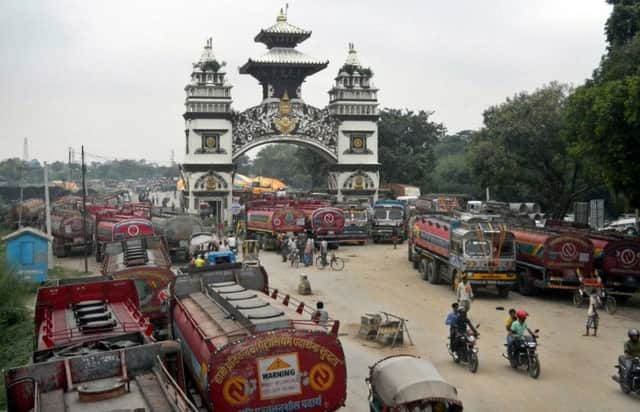Indian trucks stop bringing food and fuel to Nepal


But Nepalis, whose lives were upended by a massive earthquake just a few months ago, know how to cope. In response to the fuel shortage, people are riding their bikes to work, coordinating carpools on Facebook and offering lifts to strangers.
“At last, her big smile with her son made my day,” Garima Sapkota, who offered a ride to a woman who was late to pick up her son, wrote on the Facebook page Carpool Kathmandu, where hundreds of people have offered free rides.
Advertisement
Hide AdAdvertisement
Hide AdWhile cars have dwindled on the streets, bicycle traffic and sales have increased in Kathmandu, Nepal’s capital.
“I left my motorcycle at home because I have no fuel,” said Hari Gopal Shrestha, an electrician who had pedalled three miles to reach his client’s house.
“It is very tiring and difficult, but I have no other option.”
Long lines of vehicles snaked around petrol stations in Kathmandu amid fuel restrictions that have been imposed by the government.
Earlier in the week, the government announced that only vehicles that are vital to the transport system would get a rationed amount, while private vehicles would have to wait.
“I can drive only about 44 miles with what I get. How can I make a living with that?” said taxi driver Bharat Prasad Nepal, who had been waiting in line for 27 hours.
The shortages, which extend to fresh produce and vital medicine, come after Indian trucks carrying goods stopped crossing the border. Nepal obtains most of its fuel and other vital supplies from India.
Many Nepalis believe that India has been retaliating against their government since 20 September, when it approved a new constitution that was seen by New Delhi as discriminatory to an ethnic Indian community, the Madhesi, living in Nepal’s border districts.
Advertisement
Hide AdAdvertisement
Hide AdIndian officials have denied there is a blockade and say drivers are afraid to enter Nepal. Nepal authorities deny there is any trouble at the cross-border checkpoints.
“We can only take goods up to the border,” said Vikas Swarup, India’s foreign ministry spokesman. “Beyond the border, it is the responsibility of the Nepalese side to ensure that there is adequate safety and security for the trucks to enter.”
Madhesis are upset that the constitution divides Nepal into seven new states, with some borders slicing through their ancestral homeland in the southern plains.
Madhesis, along with several other small ethnic groups, also want the states to be made larger and for them to be granted greater autonomy over local matters.
For months, as Nepali lawmakers were debating the draft constitution, these areas witnessed violent protests by the Madhesis in which at least 45 people were killed. Hours after the constitution was passed, the violence escalated.
Only a few trucks with supplies, including fuel and cooking gas, managed to trickle through this past week.
At the vegetable market in the suburban Kathmandu neighbourhood of Lagankhel, people have complained of higher prices.
“I have to cook for a festival and all I get is rotten onions. It has become too expensive because of the blockade,” said Dinesh Maharjan, a bus driver who was out shopping for food.
Advertisement
Hide AdAdvertisement
Hide AdVegetable seller Bekha Bahadur Prajapati said people are now buying locally produced vegetables such as spinach and spring onions.
Many schools have closed because there is no fuel to run the buses. Some of them plan to run online classes for teachers and students.
Airport authorities in Nepal have instructed foreign airlines to fuel up before coming to Kathmandu or to stop at a city en route because there is not much aviation fuel in stock.
Chinese airlines cancelled flights to and from Nepal, citing fuel shortages, as supply routes from India – the Himalayan nation’s main partner – stay blocked amid the escalating civil strife.
China Southern Airlines has halted ticket sales for 1-10 October and China Eastern Airlines is offering free rescheduled flights or cancellations until 24 October after Kathmandu airport told the carriers that it cannot provide fuel for them, according to a company statement and media reports.
Nepal’s prime minister Sushil Koirala asked India to reopen the trading points, the Press Trust of India reported on Friday, adding that India has denied imposing any blockades.